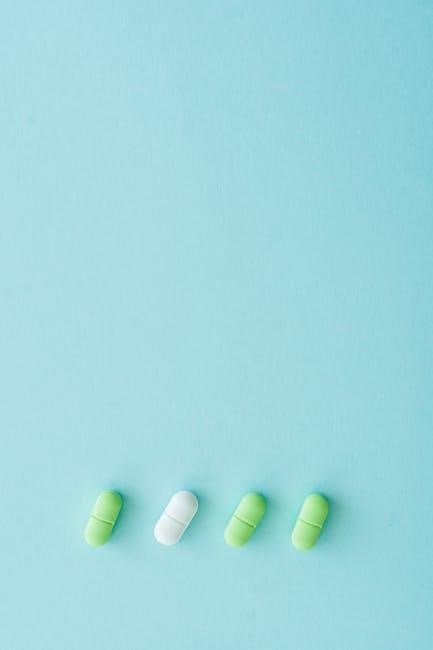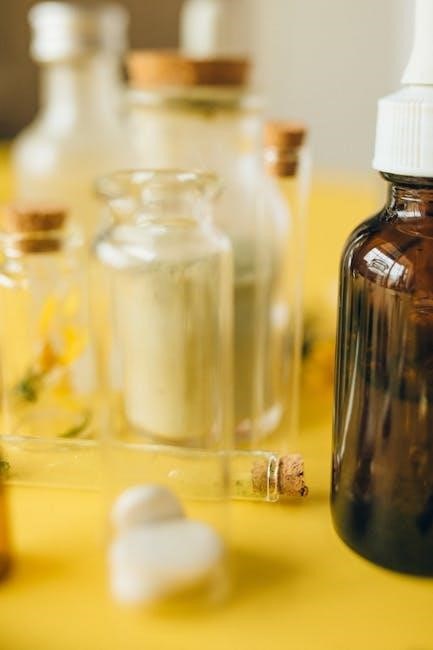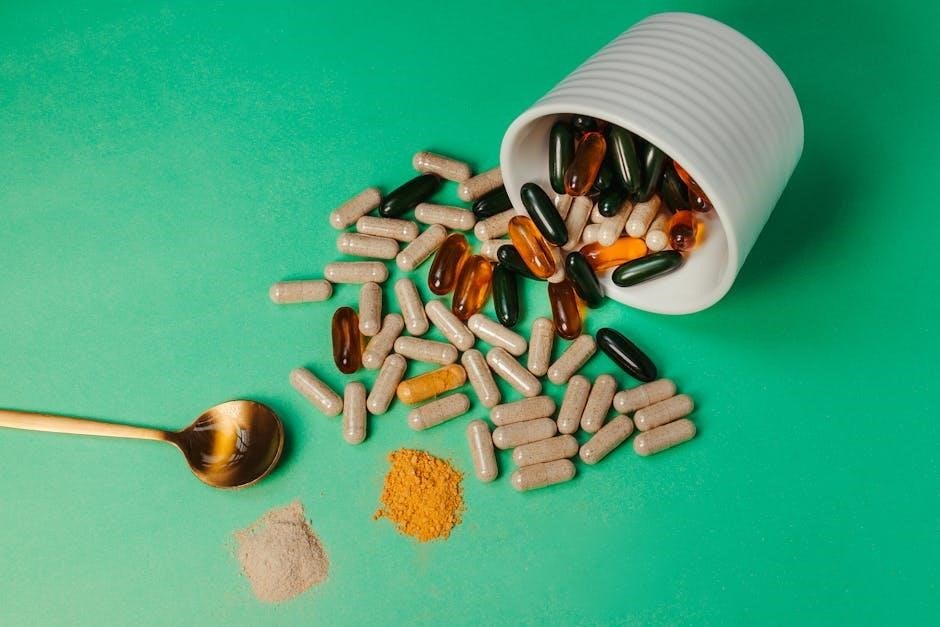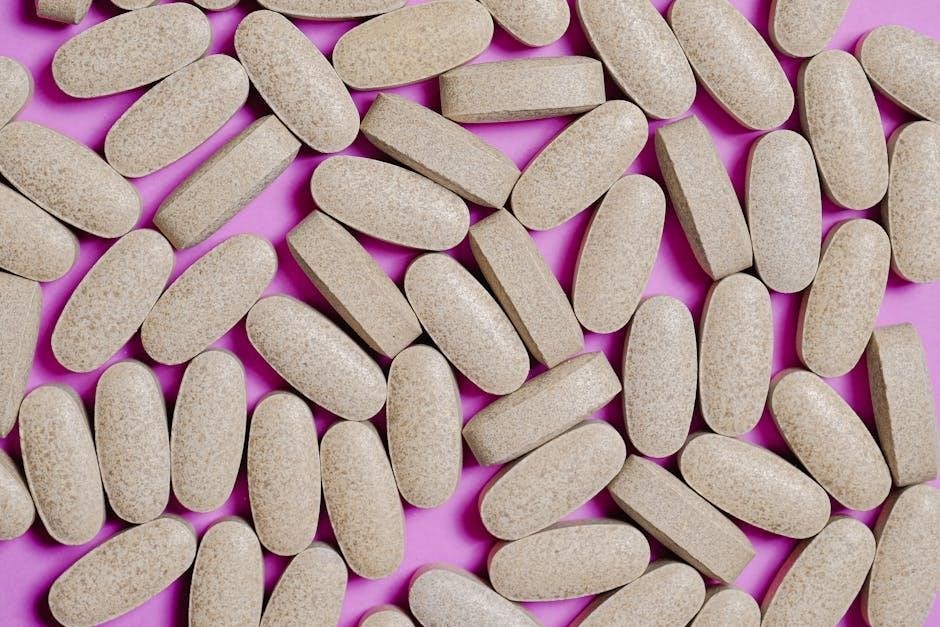the herbal tablets pdf
Herbal tablets are plant-based products used to promote health and wellness. Derived from botanicals, they are consumed in forms like tablets, capsules, or powders. Gaining popularity for their natural origin and perceived fewer side effects, herbal tablets are often used to support immune function, reduce stress, and enhance skin health. They are not regulated like prescription drugs, and their efficacy varies. Always consult a healthcare provider before use.

History and Traditional Use of Herbal Remedies
The history of herbal remedies dates back thousands of years, with ancient civilizations harnessing the therapeutic properties of plants to treat ailments and promote well-being. Early evidence of herbal medicine can be found in Egyptian, Chinese, Greek, and Roman practices. These cultures documented the use of herbs in medical texts, such as the Ebers Papyrus, which details over 800 remedies.
In traditional systems like Ayurveda and Unani, herbs were central to health practices, often combined with spiritual and philosophical beliefs. Herbal remedies were not only used to treat diseases but also to enhance vitality and prevent illnesses. For example, Chinese herbal medicine emphasized harmony with nature, using plants to balance the body’s energy, or “qi.”
Indigenous communities worldwide developed intricate knowledge of local flora, passing down recipes and methods through generations. Herbalists and traditional healers played vital roles, preparing remedies from roots, leaves, and flowers. These practices often included spiritual rituals, reflecting a holistic approach to health.
The transition from raw herbs to formulated products like tablets began with advancements in processing techniques. This evolution made herbal remedies more accessible and convenient, preserving traditional knowledge while adapting to modern lifestyles. Today, herbal tablets bridge ancient wisdom with contemporary health needs, offering natural solutions that resonate with both traditional and modern users.
- Ancient civilizations like Egypt and China documented herbal remedies.
- Traditional systems such as Ayurveda and Unani emphasize holistic health.
- Herbal knowledge was passed through generations, often with spiritual significance.
- Modern herbal tablets combine traditional herbs with advanced formulations.
Herbal remedies remain a testament to the enduring connection between humanity and nature, blending historical practices with contemporary applications to support health and wellness.

What Are Herbal Tablets?
Herbal tablets are dietary supplements made from plant extracts, designed to promote health and wellness. They are typically formulated by processing herbs into a concentrated form, which is then compressed into tablets for easy consumption. These tablets may contain single herbs or a blend of multiple botanicals, tailored to address specific health concerns or enhance overall well-being.
Herbal tablets differ from pharmaceutical drugs in that they are derived from whole plants or plant parts, such as leaves, roots, or flowers. Unlike prescription medications, they are not standardized to ensure consistent potency across batches, and their effects can vary depending on the source and preparation of the herbs. Despite this, they are widely used for their perceived natural benefits and fewer side effects compared to synthetic drugs.
These tablets are often used to support immune function, reduce stress, improve skin health, and address other common health issues. They are available over the counter and do not require a prescription, making them accessible to a broad audience. However, their lack of regulation by the FDA means that consumers must rely on manufacturer integrity and third-party testing to ensure quality and safety.
- Herbal tablets are made from plant extracts and designed for health support.
- They can contain single or blended herbs to address specific needs.
- Unlike drugs, they are not standardized for potency or efficacy.
- Popular uses include immune support and stress reduction.
- Quality varies, so choosing reputable brands is essential.
Herbal tablets offer a convenient way to incorporate traditional botanical remedies into modern lifestyles, but users should approach them with caution and consult healthcare providers before use.

Benefits of Herbal Tablets
Herbal tablets offer numerous health benefits, including immune support, stress reduction, and skin health improvement. They provide essential nutrients and antioxidants, promoting overall wellness. Many users find them effective for enhancing energy levels and mental clarity. Always consult a healthcare provider to ensure safe and appropriate use.
- Boost immune function
- Reduce stress and anxiety
- Support skin health
- Provide essential nutrients
- Enhance energy and mental clarity
4.1. Immune Support
Herbal tablets are widely recognized for their potential to enhance immune function and protect against infections. Many herbs, such as echinacea, garlic, and elderberry, are known for their immune-boosting properties. These tablets often contain antioxidants and vitamins that help strengthen the body’s natural defenses, reducing the risk of illnesses like the common cold and flu.
Echinacea, for instance, is a popular herb believed to stimulate the immune system by increasing the production of white blood cells. Garlic, rich in compounds like allicin, has antimicrobial properties that can combat pathogens. Elderberry is renowned for its antiviral effects, particularly in reducing the severity and duration of flu symptoms.
Herbal tablets also promote overall wellness by addressing underlying factors that weaken immunity, such as stress and inflammation. For example, adaptogenic herbs like ashwagandha and ginseng are often included in immune-support formulas to help the body adapt to stress and maintain balance.
When choosing herbal tablets for immune support, it’s essential to select high-quality products from reputable manufacturers. Always follow the recommended dosage and consult a healthcare provider, especially if you have underlying health conditions or are taking other medications. This ensures safe and effective use, maximizing the benefits for your immune system.
4.2. Stress Reduction
Herbal tablets are increasingly popular for their role in reducing stress and promoting mental well-being. Many herbs, such as ashwagandha, chamomile, and lavender, are known for their calming effects on the nervous system. These natural ingredients help alleviate anxiety and stress by balancing hormones and promoting relaxation.
Ashwagandha, an adaptogenic herb, is particularly effective in managing stress. It works by regulating cortisol levels, the body’s primary stress hormone, and improving overall resilience to stress. Chamomile, on the other hand, is renowned for its soothing properties and is often used in herbal remedies to calm the mind and body.
Lavender, another popular herb, is known for its ability to reduce anxiety and promote a restful sleep, which is essential for managing stress. Additionally, passionflower and valerian root are commonly used in herbal tablets for their sedative effects, helping individuals cope with stress-related insomnia and restlessness.
Herbal tablets for stress reduction are often formulated with a blend of these herbs to enhance their combined benefits. They provide a natural and holistic approach to managing stress without the side effects associated with synthetic medications. However, it’s important to choose high-quality products from reputable manufacturers and consult a healthcare provider before use, especially if you are already taking other medications or have underlying health conditions.
4.3. Skin Health
Herbal tablets play a significant role in promoting skin health by providing essential nutrients and antioxidants that support skin vitality. Many herbal ingredients, such as turmeric, aloe vera, and neem, are renowned for their beneficial effects on the skin. Turmeric, with its active compound curcumin, is known for its anti-inflammatory and antibacterial properties, making it effective in treating acne, reducing inflammation, and promoting wound healing.
Aloe vera, a natural soothing agent, is widely used in herbal tablets to hydrate the skin and alleviate conditions like sunburn, eczema, and dryness. Neem, another popular herb, is celebrated for its antifungal and antiseptic properties, which help combat skin infections and maintain a healthy complexion. Chamomile, with its calming effects, is often included in herbal formulations to soothe irritated skin and reduce redness.
Herbal tablets also contain vitamins and minerals that support collagen production, enhancing skin elasticity and reducing the appearance of fine lines and wrinkles. Additionally, antioxidants in these tablets protect the skin from oxidative stress caused by environmental factors, such as pollution and UV exposure, which can lead to premature aging.
Overall, herbal tablets offer a natural and holistic approach to achieving and maintaining healthy, glowing skin. By incorporating these products into a daily regimen, individuals can address various skin concerns while benefiting from the therapeutic properties of plants.

Safety and Precautions
Herbal tablets require caution due to potential interactions with medications and health conditions. Always follow recommended dosages and consult a healthcare provider before use, especially for pregnant women or those with chronic illnesses. Monitor for side effects like nausea or allergic reactions, and avoid exceeding the advised dosage to prevent adverse effects.
5.1. Recommended Dosage
Adhering to the recommended dosage of herbal tablets is crucial for safety and effectiveness. Since herbal supplements are not regulated like prescription drugs, the dosage can vary widely between products. Always follow the instructions provided on the label or consult a healthcare provider for personalized advice. The appropriate dosage depends on factors such as the type of herb, the individual’s health status, and the intended use of the supplement.
Herbal tablets may contain standardized extracts, which ensure consistent levels of active ingredients. However, the lack of FDA oversight means that the potency and purity of products can differ between manufacturers. Start with a low dose to assess tolerance and gradually increase if needed, under professional guidance. Exceeding the recommended dosage can lead to adverse effects, such as allergic reactions or interactions with medications.
For sensitive populations, such as pregnant women, children, or those with chronic conditions, consulting a healthcare provider is essential before using herbal tablets. They can help determine a safe and appropriate dosage based on individual needs. Never assume that “natural” products are inherently safe or devoid of risks. Proper dosing is key to minimizing potential side effects and maximizing benefits.

Regulation of Herbal Supplements
Herbal supplements are regulated by the FDA as food products, not drugs, meaning they do not require pre-market approval. Labels cannot claim to treat diseases, only general wellness. Manufacturing standards vary, and third-party testing is voluntary, leading to differences in quality and safety across products.
6.1. FDA Oversight
The FDA oversees herbal supplements under the Dietary Supplement Health and Education Act (DSHEA), classifying them as food rather than drugs. This means they are not required to undergo the rigorous testing and approval process that prescription medications do. The FDA does not evaluate the safety or effectiveness of herbal supplements before they are marketed. However, once a product is on the market, the FDA can take action if it is deemed unsafe or mislabeled. For instance, the FDA monitors for adverse event reports and can issue recalls if necessary. Despite this oversight, the lack of pre-market approval means that the quality and consistency of herbal supplements can vary widely between manufacturers. Additionally, while the FDA prohibits herbal supplements from making specific health claims, some products may carry general wellness statements. This regulatory framework aims to balance consumer access with safety concerns, though it remains a subject of debate in the healthcare community.
Choosing the Right Herbal Tablet
Selecting the right herbal tablet involves researching manufacturers and ensuring products are tested by third-party organizations for quality and safety. Look for clear labeling, standardized formulas, and avoid products with unrealistic claims. Consulting with a healthcare provider or herbalist can also guide informed decisions to meet specific health needs effectively.
7.1. Manufacturer Reputation
When selecting herbal tablets, the manufacturer’s reputation is a critical factor to ensure safety and efficacy. Reputable brands adhere to high-quality manufacturing standards, often undergoing third-party testing for purity and potency. Look for certifications from organizations like NSF International or ConsumerLab, which verify that products meet strict quality criteria.
A trustworthy manufacturer will provide clear labeling, including detailed ingredient lists, directions for use, and precautionary information. Avoid products with exaggerated or unsubstantiated claims, as these may indicate a lack of accountability. Research the company’s history, customer reviews, and whether they invest in scientific research or testing.
Some manufacturers may prioritize organic or sustainably sourced ingredients, which can be beneficial for both health and environmental reasons. Additionally, reputable brands often have a transparent supply chain and adhere to Good Manufacturing Practices (GMPs), ensuring consistency and reliability in their products.
Consulting with healthcare providers or herbalists can also help identify trustworthy brands. They may recommend manufacturers with a proven track record of producing safe and effective herbal supplements. Ultimately, choosing a reputable manufacturer is essential for ensuring that herbal tablets are both safe and effective for your health needs.

Common Herbs Used in Tablets
Popular herbs like ginger, saw palmetto, and milk thistle are often used in tablets. These herbs are valued for their potential health benefits, such as improving digestion, supporting prostate health, or aiding liver function. They are chosen for their safety profiles and traditional use in wellness practices.
8.1. Turmeric
Turmeric, a vibrant yellow-orange spice derived from the Curcuma longa plant, has been a cornerstone of traditional medicine for centuries. Its active compound, curcumin, is renowned for its potent anti-inflammatory and antioxidant properties. Turmeric is widely used in herbal tablets to support joint health, reduce inflammation, and enhance overall wellness.
Historically, turmeric has been a key ingredient in Ayurvedic and Chinese medicine, treating ailments like arthritis, digestive issues, and skin conditions. Modern research highlights its potential to improve heart health, boost brain function, and even support immune systems. Turmeric’s versatility makes it a popular choice for herbal formulations.
In tablet form, turmeric is often combined with black pepper to enhance bioavailability, as curcumin’s absorption can be limited; These tablets are convenient for those seeking natural alternatives to manage chronic conditions or maintain general health. However, it’s important to consult a healthcare provider before use, especially for individuals on medications, as turmeric can interact with certain drugs.
Overall, turmeric’s rich history, scientific backing, and versatility make it a valuable herb in the world of herbal tablets, offering numerous health benefits while remaining a natural and accessible option for many.
Usage and Dosage Guidelines
Herbal tablets should be taken as directed on the label or by a healthcare provider. Adhere to recommended dosages to avoid adverse effects. Consult a professional before use, especially if pregnant, breastfeeding, or on medication. Monitor for side effects and adjust dosage as needed. Prioritize quality and safety when selecting products.
9.1. Proper Dosage
Proper dosage of herbal tablets is essential to ensure safety and effectiveness. Always follow the instructions provided by the manufacturer or healthcare provider. Exceeding the recommended dose can lead to adverse effects, while insufficient dosage may reduce efficacy. Dosage requirements vary based on factors such as age, health status, and the specific herb used. For instance, certain herbs like turmeric may be tolerated in higher amounts, while others, such as St; John’s Wort, require precise dosing due to potential interactions with medications. It is crucial to consult with a healthcare professional before starting any herbal regimen, especially for individuals with pre-existing conditions or those taking prescription drugs. Additionally, be aware of any contraindications or warnings on the product label. Monitoring for side effects and adjusting the dosage under professional guidance can help maximize benefits while minimizing risks. Remember, herbal tablets are not regulated as strictly as pharmaceuticals, so relying on credible sources and manufacturers is key to safe usage.

